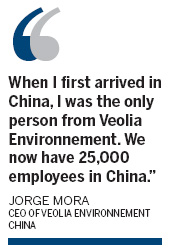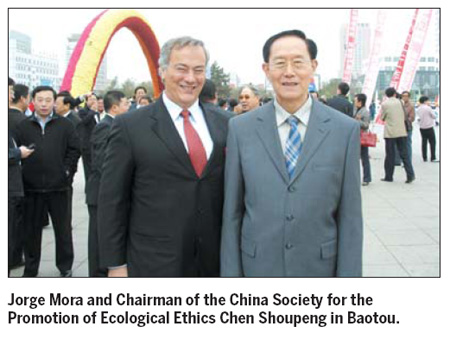Veolia: Social responsibility core value

Sixteen years ago Jorge Mora, CEO of Veolia Environnement China, was the only member of its management team in China, but today the company has operations in more than 30 cities across the mainland.
"When I first arrived in China, I was the only person from Veolia Environnement. We now have 25,000 employees in China," said Mora.
Today one of his core concerns is corporate responsibility. Each company has its social responsibilities, Mora said, adding that he believes enterprises' social responsibility is a very wide concept and seems to include everything.
For Mora, the social responsibility combines four elements of stakeholder, shareholders, employees, the public and the environment.
"The current direction is that all enterprises now claim to have social responsibility, but the reality is covered over," he said.
"Our motto is that talk is one's action, action is one's talk, and our conduct should agree with our words," he said.
He said a modern enterprise should make a profit to keep the shareholders happy, take care of employees and provide them with good training, education and safety guarantees, while providing the public with safe services,.
"It should also pay attention to the environment and sustainable development which are closely linked together."
"Veolia's work is to protect the environment, and environment protection is the premise of our work. We have strict policies, just like the law in a country, to ensure our commitment to environmental protection and sustainable development," he said.
Mora said his company will never breach its morality. "In this set of enterprise policy, no item is less important, and each one is relating to the whole with equal importance. We have our internal assessment standard for environment protection, even higher than that of some countries," he said.
Veolia in China
Founded in France in 1852 to build water agricultural and city supplies, what is today called Veolia Environnement is now a global company providing water, waste treatment and energy services.
It came to China in 1992 to meet the water, waste management, energy and public transport needs of municipal and industrial customers.
Veolia began helping improve China's environment in the early 1990s and has now invested more than $2 billion in the nation.
It has built 68 waste treatment, water management facilities - including drinking water and sewage treatment, energy and public transport projects in 41 cities both on the mainland and in Hong Kong, Macao and Taiwan.
The company pays high attention to the localization of human resources. Its three country managers for waste, water and energy management are all local Chinese. Veolia recruits outstanding Chinese to be in charge of its development in China more and more.
"In this way, Veolia can do the best in China and maintain its leading position in the environmental protection sector," said Mora.
Mora said the company recruits good employees, provides good training and then offers good opportunities for employees.
"Once the employees feel happy, the company can then be possibly successful," he said.
Education programs
Since it came to China, Veolia has also promoted environmental protection education for the public. It has cooperated for five consecutive years with UNESCO and the UN Environment Programme to enhance environmental awareness in children to protect the environment for five years in a row.
The company has also sponsored more than 100 local government officials and academics in training on sustainable development at Tsinghua University and institutions overseas.
It established a joint research center with Tsinghua and cooperated with Tongji University on another program.
In 2006 Veolia began to focus on ecological education in partnership with noted expert Chen Shoupeng, chairman of the China Society for the Promotion of Ecological Ethics.
In Baotou of Inner Mongolia autonomous region the effort created an "Environmental Protection Guard" in primary students.
In Pinggu district of Beijing, they helped plant 24 hectares of forests.
And they together hosted the China International Forum on Ecological Civilization and Green Competition in Beijing and Chengdu.
Mora loves the Chinese culture and has his own opinion on the Chinese classic books.
"I am greatly influenced by the Confucius ideology and the general thinking of Taoism," he said. "It has changed my way of thinking and attitude towards matters to some extents."
"The intelligence exists in his heart and brains. When you fall down, you should continue to tell yourself to get up," said Mora.

(China Daily 04/30/2010 page12)














